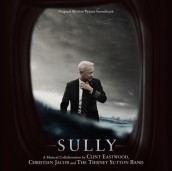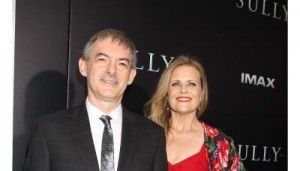
SULLY composers Christian Jacob and Tierney Sutton | ©2016 Christian Jacob and Tierney Sutton
Catastrophe and American heroism have long been passengers together in Hollywood, as square-jawed, macho men save the chosen few with the aid of scores as fiery as their commanding voices. But sometimes real life miraculously allows everyone involved in a disaster to not only survive, but to become a movie whose savior is as resonantly soft-spoken as his score. Such is the astonishing case to be seen, and heard in filmmaker Clint Eastwood’s gripping, and moving dramatization of “The Miracle on the Hudson,” when white-haired pilot Chelsey “Sully” Sullenberger somehow managed to land U.S. Airway Flight 1549 in New York City’s famed river, with all 155 souls intact. Where sound effects and the Imax screen repeatedly convey the desperate suspense of engines exploding and a smash into water, the music of SULLY remains in steadfast, tonal control of both heart and bravery. It’s the definition of how a tough guy icon has matured into a senior citizen director-composer, whose youthfully vital work more remains the definition of playing quietly and carrying a big emotive stick.
Composing themes and score with an emphasis on the piano, Clint Eastwood’s melodies demonstrate simplicity at its finest, from the regretful “Claudia’s Song” of UNFORGIVEN to THE BRIDGES OF MADISON COUNTY’s lyrical “Doe Eyes” and the transcendent lyricism of HEREAFTER. Where Eastwood has applied his film’s soundtracks in in short, effective measure SULLY follows perhaps the most interesting musical flight plan of his repertoire. It offers more score than usual (If still less than thirty minutes), and does so in a uniquely jazzy tone for what’s essentially a disaster movie with a happy ending. Taking the navigator seats to incorporate Eastwood’s themes with their own is jazz pianist Christian Jacob, while his stage leader Tiernery Sutton and her band apply beautiful voice and cool grooves to a embody a quiet, commanding hero who first faces death, and then the disbelieving faces of a government panel determined to question his judgment.
SULLY‘s score is a collaboration between like-minded jazz lovers that works as both club piece and score. Jacob’s confidant, lyrical piano theme captures the relief of improbable survival, with nobly subtle strings gracing the confidence of a command decision. Sutton’s lovely vocalese speaks for a wife’s tender concern, and nightmares the captain still can’t escape from, while tight percussion runs with Sully to view the air force jets that fueled his love of flight. AIRPORT this score is not, with all respects to Alfred Newman.
Chalk it up to Clint Eastwood’s admiration of The Tierney Sutton Band, and its Grammy nominated leader-singer. As a vital sound of their lyrical tones, pianist Christian Jacob’s own background includes stints with such well-noted performers as Maynard Ferguson and Bill Holman. Sutton’s band also counts among its members drummer Ray Brinker (who’s appeared on such soundtracks as CHICKEN LITTLE and ASSAULT ON PRECINCT 13), bassist Trey Henry (who’s jammed on RUSH HOUR and Eastwood’s J. EDGAR) and fellow bassist Kevin Axt, who’s been similarly busy as a score session player. The band’s own prolific discography has included “American Road,” “On the Other Side” and a new interpretation of the songs of Sting. Now with their soulful work alongside Eastwood and SULLY, these bandmates have made a strong impression on how to play jazz perilously close to the angels, and survive with both dignity and cool vibes.
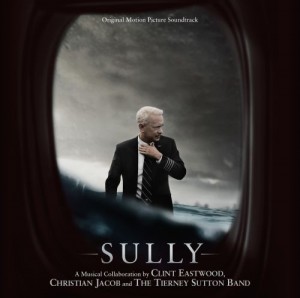
SULLY soundtrack | ©2016 Varese Sarabande Records
ASSIGNNMENT X: How does respectively growing up in France and Milwaukee differ when it comes to gaining an appreciation for jazz and classical music?
CHRISTIAN JACOB: I don’t know about Milwaukee, but in France, jazz has always been popular. It just didn’t reach my ears until I was nine and I heard “Take Five” from Dave Brubeck on the radio. It is true that at the time classical music was considered (for lack of a better word) “serious music” and that jazz was ignored by my teachers. So while I was an arduous student, raised 100% focused on becoming a classical concert pianist, surrounded by all the greatest classical pieces, I was hearing jazz more and more and became drawn to it. Oscar Peterson was my next discovery, and many more came after that…
TIERNEY SUTTON: In Milwaukee I wasn’t exposed to jazz at all, except in film soundtracks or occasional ambient music. I didn’t discover jazz until college. As a child I sang in classical choirs and school musicals, but that music didn’t “grab” me or make me want to be a professional singer. Serious classical music, of depth and sophistication, also wasn’t around…only “surface” and popular classical music made it to my ears. My jazz heroes introduced me to serious classical music.
AX: When it comes to jazz and classical music, what links do you find between one distinctly American form of music that’s about improvisation, and the other a European style that’s about control and structure?
JACOB: The reality is that classical and jazz are two different styles of music, and even though improvisation is known to belong to jazz, it used to be an existing art form in classical style that unfortunately has been lost. I remember that even Pierre Sancan, my classical master loved to improvise. Jazz has a freedom of expression, which is a style enhanced by improvisation. But improvisation is made over a structure of harmonies and rhythm that are very similar to classical. So while they are different, they both own structure and freedom, so I would consider jazz and classical as two different areas of the same world.
SUTTON: Because I was never educated or steeped in classical music—or jazz for that matter—maybe I shouldn’t answer…but for me, I hear melody, structure and form in both styles and don’t have them separated in my head. A beautiful melody is a beautiful melody and, as Christian said, there was improvisation in classical music first. I’m hoping to do a project with my friend Natalie Dessay, the great French soprano. When we talk about songs or melodies we like, it’s just as likely to be Rachmaninov or Mompou as it is to be Coltrane or Bill Evans.
AX: How did you first team together for the Tierney Sutton Band?
JACOB: Trey Henry, Ray Brinker and myself have known each other since the 90’s. We were playing together in Maynard Ferguson Big Band. I remember hearing Tierney sing at a Jack Sheldon rehearsal where Trey, Ray and I were the rhythm section. We all loved her voice and ability to swing and improvise on a tune. We knew right away she was a complete musician. She on her side was impressed by the quality of musicianship she was hearing. Soon after, she got a recording contract for her debut CD, and asked us to be the rhythm section. Ten CDs later, we are still together…
SUTTON: It was good luck for me that I moved to Los Angeles within a year of Christian making the same move. I knew his reputation from Boston and when I heard him play (and the other band members) I knew I had found some special musicians. Earl on, Oscar Peterson told Telarc my trio was terrific and they should let me record with them. That was a big help to form and keep together a band. We went on to make 7 CDs for Telarc and the soundtrack for “Sully” and our latest CD “The Sting Variations” will be our 10th and 11th releases as a band. It’s been over 20 years, That’s not bad. It’s also worth noting that we are incorporated partners, which is unique as far as I know.
AX: From watching Clint Eastwood’s past films as a director, what struck you about the music he composed, and his use of it?
JACOB: Even though people say Clint Eastwood uses very little music in his films, I never found myself missing the music, so that tells me he is doing something right. I’ve watch many films where I found myself rolling my eyes when the music swells and forces its emotional opinion on me. I do like to mention that I am a fan of Lennie Niehaus. He has been such a big part of the music in Clint’s movies.
SUTTON: Clint’s composition style is patient, quiet and conversational. (the first 2 adjectives describe his personality as well). I was struck by his melody (that became “Flying Home”, the end title song of the film) when he played it for Christian and me. I woke up the next morning with the phrases stuck in my head. At that time I hadn’t given any thought to writing a lyric to it. I just knew that I would be singing it for cues in “Sully” —that day! So I wanted to be steeped in it. That time with the theme helped a lot when I decided I wanted to write lyrics. I would agree with what Christian said about Clint’s musical sense in his films. He uses it sparingly, but he’s thinking about it and understands it. I don’t know if that’s so true with many other directors. One thing that I think might surprise people is what a time commitment Clint made to this creative process —he was with the band for 10 hours at a time, experimenting with cues and themes with the picture. He was right there.
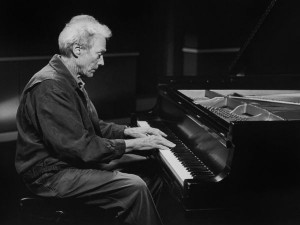
SULLY director and theme composer Clint Eastwood| ©2016 Clint Eastwood
AX: What was it like finding out that Clint was a fan of the band, let alone that he wanted you to score, and sing on the soundtrack?
JACOB: Clint has been following the band for around 10 years. What a great honor. A couple little stories that are dear to my heart: last year, the band was playing Catalina Bar & Grill on Sunset Blvd for 3 straight nights. Clint came to see us on the 2nd night, I unfortunately had a prior commitment and wasn’t there that night. I am sure he enjoyed his evening, but did inquire as to why I wasn’t there. Anyway, he came back again the next day so he could hear me play with the band. I was thrilled.
Here is another ego boosting story; when Tierney and I attended the very first screening, he turned to us and said, “I’d like to have my favorite singer and my favorite pianist on this movie.”
SUTTON: This has been a surreal experience and a great honor. The band did a private concert for Clint and some friends in Carmel last March and it just happened that my father passed away (after a long illness) the day I flew up to Carmel for the show. Somehow this feels like my dad—he was such an enormous fan of Clint’s and would have gone crazy over all of this.
AX: When you heard about Sully’s story on the news, what was your reaction?
JACOB: When the real thing happened, it was a mixture of disbelief and amazement. I remember thinking how scary this whole event must have been as a passenger, and how the crew’s professionalism was imperative in a moment like this one. I never heard about the doubts that ensued, and not knowing that made me so receptive during that first screening that it probably helped me come up with the atmosphere of the theme.
SUTTON: I remember feeling very happy and proud—and I remember hearing what a lovely, noble guy Sully was on top of the “feat.” Like Christian I knew nothing about the stress and trials that followed.
AX: Given that Clint was a fan of jazz from its be bop days, how do you think his knowledge of the art form played into his appreciation of knowing how jazz could work in a film score?
JACOB: I think it was just a natural thing for him. Anyone who is a fan of a certain style of music will be influenced to use that particular style. Clint has been very open minded with the music. He was clear he wanted something different than the usual approach. He was very attracted by the collaborative approach of our band. In this movie I find the jazz element being more harmonic than rhythmic. Of course the improvisational aspect comes from jazz, but I am not sure that “jazz” is the right word to define this score. Jazz has so many interpretations, it is part of such a big umbrella, it blends into so many other types of music. It is all about change, and labeling something “jazz” is a very vague description. Even in our band, we are not convinced that we should be called a “jazz group.”
SUTTON: Yes, I agree. Certainly there is jazz in the score, but Christian’s orchestral writing is, to my ear, in the tradition of the great classical orchestral score writer’s out there…and the songs in the score…I don’t think they’re really “jazz” per se. Clint obviously has a sophisticated musical palette, let’s say that.
AX: Could you talk about Clint’s composing process in creating the themes? Is it as easy as him sitting at a piano and tinkering about to create a memorable melody? And do you think there’s something to be said about that kind of melodic “simplicity” that defines his music?
JACOB: While seeing the unfinished movie for the first time, I perceived Sully’s personality. I immediately had a musical idea in my head. By the end of the screening, this idea had developed into a pretty clear melody. I told Clint that I already had an idea and he told me that he had a theme in mind as well, so he invited me to come back the next day and we shared our ideas over a piano. Clint had worked out a beautiful melody, and hearing mine, he said: “I’m glad we are on the same page”. He said that I didn’t have to use his theme if it didn’t fit with my approach, but I eventually fell in love with that melody. I then harmonized it my way and we used it quite a lot in different settings. We ended up with a total of 4 themes I have written 3 of them: one being my original idea while screening the movie, another one was a vindication theme (“Arrow”), while the 3rd one was more of a stress harmonic series. Tierney, Trey, Ray and myself then improvised versions of those 4 themes while following the movie on the screen, and while Clint was intently listening and guiding us towards his preferences. Some of his comments: “I would like more space here”; “I love the lower range of Tierney’s voice”, “only piano on this scene”, etc. Tierney later wrote lyrics for Clint’s theme and for “Arrow.”
AX: Clint’s themes for his main characters always have a noble, Americana quality to them. How would you describe Sully’s?
SUTTON: “Noble” is a good word to describe the theme Clint offered that became “Flying Home”. Apparently he had been playing around with the melody for several years and at first I was a bit intimidated to approach adding lyrics. I asked a songwriter friend of mine, JB Eckl, to come and collaborate with me. I’d completed the lyrics to “Arrow”, one of Christian’s themes and was afraid I was tapped out. We both decided that the approach should be intimate and conversational. We did one draft and I showed it to Clint and I don’t think he loved it…and I didn’t love it yet! But I knew we were getting there. I think the phrase Clint used as a suggestion was “down to earth.” I knew he was also a big fan of Alan and Marilyn Bergman (who are close friends of mine) so I also was committed to a certain craft of rhyme and form in the lyrics (something that often is considered old fashioned). So I hunkered down and spent a few more long days honing it. I even went to consult with Alan and Marilyn—who offered one word to the lyric- (I’m not telling!) Then I had another consultation with JB the morning it was to be recorded. The final question about one word was literally answered in my car on the way to Warner Brothers. When I sang it that day, Clint said he cried. I figured then that we’d succeeded!
AX: What was your collaboration like with Clint in turning his themes into the score? And how did the score develop from what you’d initially planned?
JACOB: We know that a lot of music would be cut from what we originally recorded. Clint was actually clear with us right away telling us that he would rather have too much than not enough. So we did record quite a lot. I think the soundtrack album will be witness of that. I really appreciated Clint’s trust in all of us; he was really letting us do our thing, while having many ideas of his own. He became like another part of the band, and I could tell he loved it.
SUTTON: Yes. This really was just a 6th artist adding his vision and colors to the band process. Clint is now an auxiliary member of The Tierney Sutton Band for life – if he wants to be!
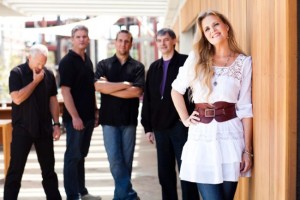
The Tierney Sutton Band: Right to left: Tierney Sutton, Christian Jacob, Kevin Axt, Trey Henry, Ray Brinker | ©2016 The Tierney Sutton Band
AX: Tierney, your jazz vocalese adds a quietly haunting power to the score. How did you get the idea to use your voice on the score, and how did you want your voice to reflect the emotions of such an inward man?
SUTTON: I have always loved to do workless vocals. It’s pretty much my favorite thing do. I also have the aesthetic that if the vocal is right, it should be transparent and disappear, like a watercolor. I think that’s a pretty natural fit for a film score. I did find myself wanting the volume and level of the vocal to be soooooo quiet so as not to distract from the film or draw too much attention to it. I’m happy with how it turned out.
AX: The piano is a strong voice in SULLY, as well as the lush use of strings. Was that direction a given at the start?
JACOB: It kind of ended up this way. Remember, those cues were improvised on the spot, Clint liked a lot of piano solo cues. \He particularly liked the very spacey ones. Quite a few times he asked me to try a version with more space. He had used my recording of “Body & Soul” from my newest release “Beautiful Jazz” in the temp music. So, for the film, I reproduced the same feel on Sully’s theme used on the hospital scene.
AX: What do you think the score says about what makes an American hero?
JACOB: I like to think that the score, while being mainly improvised, has a depth to it, a purity, and a human nature that touches your soul. I was very touched myself by this movie, and I needed to have a seriousness, a wisdom in the score, but also a freshness in the result.
SUTTON: Christian wrote his French butt off… in a very short time. Keep in mind that we were asked to do the score on Thursday afternoon and by Saturday morning, we were in the studio, with picture, scoring this thing…with Clint directing us scene by scene. Christian arrived at that session with Clint’s theme harmonized beautifully and 3 themes of his own. After those 2 days, Christian wrote and orchestrated like a mad man to prepare the orchestra Suite for the end title (9 1/2 minutes and sweeten the band cues). The result is the beautifully crafted, many-layered score that will only be fully heard on the soundtrack album.
AX: You could call SULLY a real-life “disaster film” with a thankfully happy ending. How did you want the score to contrast with the bombastic expectations that usually accompany the genre, especially in its use of jazz?
JACOB: I knew right away that a bombastic approach to the music would be totally wrong; the sound effects, the IMAX, the screams, etc. are enough to make you feel the disaster part of the movie; I thought the real life aspect of the music would be much more welcome by enhancing the human element of such a story, and I think that Clint had the same feeling.
SUTTON: Christian and I both immediately felt the film was about deep emotions and the last thing we wanted was something bombastic. The think that moved me the most in the first screening was the fact that Sully never gets to a place of false or forced confidence. He allows himself to stand in the questions, in the doubt. That’s where the phrase “standing inside the questions” came from in the lyric I wrote to “Flying Home”. That tenderness and doubt and vulnerability are so compelling and we wanted the music to reinforce that.

SULLY | ©2016 Warner Bros.
AX: Clint’s movies usually have very sparse use of score, while “Sully” seems to feature more music than most. How did you decide where to place the music, especially when it came to the water landing?
SUTTON: In the end, all these decisions were Clint’s (of course!) and he knows what he’s doing. He told us that in a film like this, there are a LOT of special effects nowadays and that music is often sacrificed. But I have to tell you, we had the glorious and as I understand it RARE experience of feeling like the director was always on our side and always wanted to hear the music and see if it could work, even if the scene seemed fine without it. Several times cues were put back in and Clint said, “It’s just too beautiful. It’ll distract from the scene,” I mean, if your cue’s gonna get the axe, you can’t complain about the reason given.
AX: Where the music plays emotion without specifically trying to hit the action, the one, most “score”-like sequence of the film involves the simulations of Sully’s landing as the government tries to cast blame on him. How did you want to capture the tension of the scene?
JACOB: This started again as a group improvisation while watching the scene, it did fit the scene very well in an interesting way because of the drumbeat. I then later scored those takes for low strings, low horns and bassoons, and wrote a few for the orchestra without the band, using the same feeling of tension.
AX: How would you describe “movie jazz” versus “band jazz?” And what would you say was the biggest difference between accompanying each other in a group, and on a film score?
JACOB: When we work within the band, we usually develop an arrangement over a certain period of time; performing it in front of an audience makes an arrangement grow, our way of performing it develops with time.
With the movie we really got the seed of the cues on those first improvisations. Sound effects being added later made it difficult for us to guess whether certain cues would survive or not, but we didn’t want to censure ourselves, so we kept our juices flowing as much as we could.
AX: SULLY was recorded at the Eastwood Scoring stage at Warner Brothers. What’s the experience like of being in a studio named after your director, let alone being given top Hollywood players to perform your first score?
JACOB: It did feel like an incredible opportunity. I personally was especially blessed, since I did all the orchestrations, and had this incredible orchestra at my disposal. The feel of trust I was given was out of this world. I was hopeful the entire time that my writing was worth that amount of trust. The orchestra’s response has been very warm to me, which was very gratifying. I should point out that Trey Henry, Kevin Axt and Ray Brinker are three of the top LA studio musicians themselves, and are usually first call on these types of sessions.
SUTTON: Several members of the orchestra came into the both where I was sitting next to Clint and thanked him for using such great music.
AX: Could you talk about writing, and performing the songs “Arrow” and “Flying Home,” and how you wanted them to thematically reflect the film, and score?
SUTTON: Everything in the score was developed and finished in one month. The lyrics came in the second two weeks. I’ve already spoken a bit about this process, but I will say that in order to prepare to write, I read Sully’s memoir “Highest Duty; My Search for What Really Matters” and took copious notes. I wanted the songs to reflect the film of course, but maybe more than that, I wanted them to contain something of the inner life of the man himself. I have no clue if I succeeded, but he’s a wonderful guy and it was a pleasure to have the ideas from his book as my starting point, along with the film.
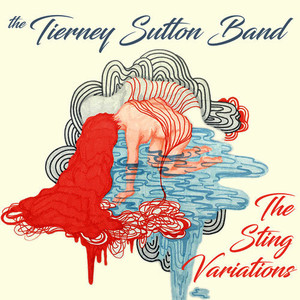
THE STING VARIATIONS | ©2016 BFM Jazz
AX: Tell us about the band’s “The Sting Variations,” and what inspired the album. Given that his songs have a strong jazz element, what kind of spin did you want to put on them?
JACOB: For basically our entire career as a band we always have worked on jazz standards, mainly the American songbook. We knew that we wanted to challenge ourselves in a slightly new direction. Trey Henry became very inspired and for the first time ever, one of us took the lead as producer; He came up with many brilliant ideas that inspired all of us. Being together for more than 20 years, he knew how every band member could develop his ideas. The fact that we all love and respect the music of Sting made it a perfect choice.
AX: Do you think SULLY has inspired you to continue pursuing film music, and title songs? And in a bigger picture, what do you think that Clint’s choice of you for SULLY says to the broader picture of giving artists you wouldn’t expect to do a major Hollywood score the chance, especially when it comes to creating an “offbeat” soundtracks like this one?
JACOB: I do hope to pursue film music. Composing and orchestrating has always been a major passion of mine, and to be part of a team like the team that created SULLY is an immense honor. Many years ago I scored a Japanese series named ZENTRIX for a studio in Los Angeles, and that I believe gave me a good foundation for this project. Being chosen for this film feels like a gift. We are well aware that many composers would have loved to score SULLY, and the music could have been done in many different ways. I also believe that Clint Eastwood chose well in having the Tierney Sutton Band doing the music for SULLY.
SUTTON: I just want to add that I think the team was more fortunate that they knew to have Christian’s skills at the ready for this score. I also think that our band process, that necessitates a high level of collaboration, patience and detachment, made us a great fit. We’d love to do it again.
Christian Jacob and The Tierney Sutton Band smoothly land their SULLY score with Clint Eastwood soon on Varese Sarabande Records, (the longtime home of many Clint Eastwood Soundtracks), available digitally on September 30th, and on CD October 21st
Buy The Sting Variations HERE
Visit Christian Jacob’s website HERE
Visit The Tierney Sutton Band’s website HERE
LEAVE A COMMENT BELOW AND LET US KNOW WHAT YOU THINK!
Follow us on Twitter at ASSIGNMENT X
Like us on Facebook at ASSIGNMENTX
Article Source: Assignment X
Article: Interview: SULLY composers Christian Jacob and Tierney Sutton
Related Posts:




